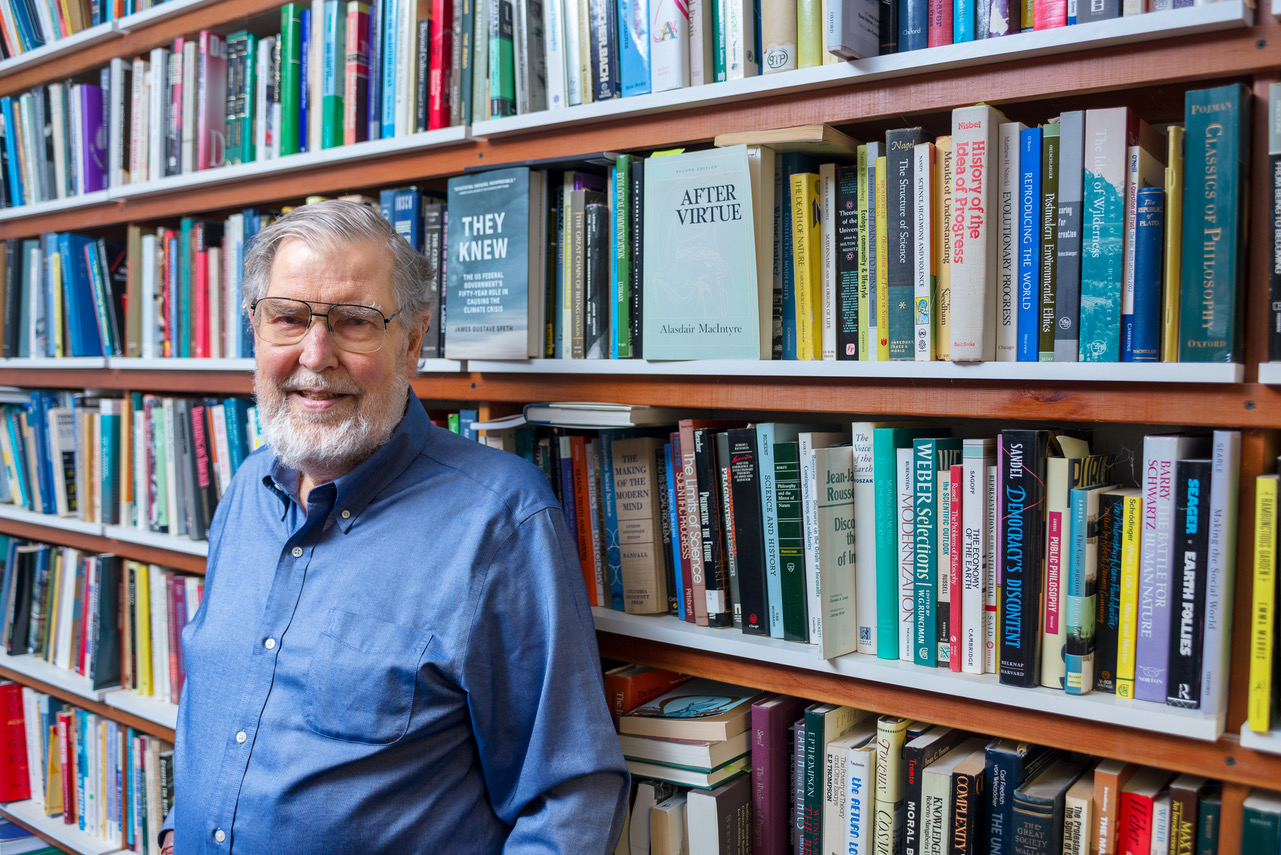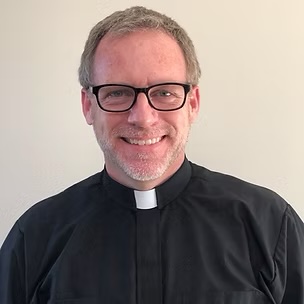Annual Russell Family Research Fellowship in Religion and Science
The annual Russell Family Research Fellowship in Religion and Science brings internationally distinguished scholars in religion and science to the GTU.
Since 1981, Russell Fellows have been in residence at CTNS/GTU every year to conduct research, teach doctoral and seminary courses and present public lectures at the GTU and at other San Francisco Bay Area locations.
The annual Russell Family Fellowship in Religion and Science was created in memory of John K. Russell (1896-1958). Mr. Russell, born of Italian immigrants, was an industrial engineer and humanitarian. In 2015, The J.K. Russell Research Fellowship in Religion and Science was renamed the Russell Family Fellowship in Religion and Science to honor the contributions of the Russell Family as a whole to this annual Fellowship.
2024-25 Russell Family Research Fellowship


Photo credit: Matt Burciaga
2024-2025 Fellows: Richard B. Norgaard & Dan Smith
Professor Norgaard is an economist by training (Chicago PhD 71) but his convictions stem from the beauty of nature’s intricate order. Seeing the Glen Canyon go under Reservoir Powell made him mad enough to become an economist. He joined Berkeley’s faculty in 1970 and has been an emeritus professor of Energy and Resources since 2013. He became a transdisciplinary scholar through research on domestic and international issues and service on numerous scientific committees including serving as the first chair of the State of California’s Delta Independent Science Board. He co-taught, with Robert Russell and Ted Peters, a course on environment and religion.
Dan Smith is an ELCA pastor and theologian. His doctoral work (GTU, 2013) aimed to develop a Lutheran theology of nature to address the climate crisis. His academic and pastoral work has focused on ecological and ecumenical theology from a Lutheran perspective for the sake of the healing of the earth and care for its many creatures, ecosystems, and communities. He has served as pastor of Lutheran Church of the Incarnation in Davis, CA since 2010.
--------------------------------------------------------------
"Finding Hope on a Warming Planet: a dialogue between an economist and a theologian"
The Annual Russell Family Research Conference - Click to Register for the Event
Saturday, May 3, 2025 @ 12 pm - 5 pm, Pacific Time
This presentation will present an ecological-economic and a theological-ethical analysis of the challenge of climate change. What is the nature of science and faith today that has led to an increasing detachment from reality and morality? The talk will explore how faith, science and related disciplines can be part of solving this crisis and promoting greater health in our social, intellectual and political life.
| 12:00 PM - 12:15 | Welcome Remarks |
| 12:15 - 1:15 | Russell Family Research Fellows Presentation |
| 1:15 - 1:30 | Respondent 1: Rita Sherma |
| 1:30 - 1:45 | Discussion between Fellows and Respondent |
| 1:45 - 2:00 | Q&A |
| 2:00 - 2:15 | Break |
| 2:15 - 2:30 | Respondent 2: Tobi Ife-Adediran |
| 2:30 - 2:45 | Discussion between Fellows and Respondent |
| 2:45 - 3:00 | Respondent 3: Ted Peters |
| 3:00 - 3:15 | Discussion between Fellows and Respondent |
| 3:15 - 3:30 | Break |
| 3:30 - 3:45 | Q&A |
| 3:45 - 4:00 | Final Remarks from the Russell Family Research Fellows |
| 4:00 - 4:15 | Charles Townes Graduate Student Fellowship Announcement |
This event is free and open to the public. Registration required. This event will be in hybrid format. You are welcome to attend in person or online.
You will receive the Zoom link once you register for the event.
Questions? Please email ctns-info@gtu.edu.
--------------------------------------------------------------
Past CTNS Russell Research Fellows
Brian Patrick Green — 2023-2024
Emerging Technologies as Provocations for Theology and Ethics
Kirk Wegter-McNelly — 2021-2022
Engaging Hypotheticals: Groundwork for the Study of Theology in a Secular Academic Context
Adam Pryor — 2019-2020
Living Into our Shared Humanity: Exploring the Religious Significance of Astrobiology
Joshua M. Moritz — 2018-2019
What has Science to do with Youth Ministry?: Why Theological Engagement with the Natural Sciences is Vital for Effective and Impactful Youth Ministry
Ron Cole-Turner — 2017-2018
New Perspectives from Science on Human Origins
Hava Tirosh-Samuelson — 2016-2017
Religion, Science and Technology: Jewish Perspectives
Terrence W. Deacon and Tyrone Cashman — 2015-2016
Science, Naturalized Teleology and a Metaphysics of Incompleteness
Noreen Herzfeld — 2014-2015
More than Information: A Christian Critique of a New Dualism
Alex Filippenko — 2013-2014
Life in the Universe, Scientific and Religious Perspectives
Niels Henrik Gregersen — 2012-2013
God, Information and the Sciences of Complexity
J. K. Russell Research Fellowship / CTNS 30th Anniversary Conference — 2011-2012
God and Creation: Jewish, Christian and Muslim Perspectives on Scientific Cosmology
Alnoor Dhanani, Daniel Matt and William Stoeger, SJ, Joint Fellows
Thomas Tracy — 2010-2011
Scientific Vetoes and the "Hands-Off God": Can we Say that God Acts in History?
Francisco J. Ayala — 2008-2009
Darwin's Gift to Science and Religion
George V. Coyne — 2007-2008
Twenty Years After the New View from Rome: Pope John Paul II on Science and Religion
Celia Deane-Drummond — 2006-2007
The Evolution of Sin and the Redemption of Nature
Martinez Hewlett and Ted Peters — 2005-2006
Assessing the Case(s) for Theistic Evolution
Niels Henrik Gregersen — 2003-2004
Complexity Studies and Theories of Emergence: What Does It All Mean for Religion?
The Complexification of Nature: Supplementing the Neo-Darwinian Paradigm
Paul Davies — 2002-2003
Multiverse and Anthropic Fine-Tuning: Philosophical and Theological Implications
Archbishop Joseph Zycinski — 2001-2002
Beyond Necessity and Design: God's Immanence in the Process of Evolution
Philip Clayton — 2000-2001
The Emergence of Spirit
John Cobb, Jr. — 1999-2000
Science, Theology and Whitehead's Philosophy
Nancey Murphy — 1998-1999
Neuroscience, Mental Causation, and Freedom of the Will
Mary-Claire King — 1997-1998
Theological and Ethical Implications of Recent Research in Genetics
John Haught — 1996-1997
Science, Religion, and the Role of Metaphysics
Margaret Wertheim — 1995-1996
Women in Science, Women in Theology
George F.R. Ellis — 1994
What Does Scientific Cosmology Tell Us About God
Mary Gerhart & Allan M. Russell — 1993
Metaphoric Process as the Reformation of Worlds of Meaning in Theology and Natural Sciences
CTNS Decade Conference — 1992
Building Bridges Between Theology and Science: Beginning the Second Decade of CTNS
Holmes Rolston, III — 1991
Genes, Genesis, and God in Natural and Human History
Robert W. Jensen — 1990
Does God Have Time? The Doctrine of the Trinity and the Concept of Time in Physical Sciences
John Polkinghorne — 1990
The Church and the Environmental Crisis: Which Way Are We Heading?
God's Interaction with the World: Research Proposals by John Polkinghorne
The Challenge of Physics to World Religions
Lindon Eaves — 1988-1989
Genes, Culture and Personality: An Empirical Approach
William R. Stoeger, S.J. — 1987-1988
Cosmology and What It Tells Us About Physical Reality Philosophical and Theological Implications of Contemporary Cosmology-the Philosophy and Theology of Creation
Ernan McMullin — 1986-1987
The Viability of Natural Theology from a Roman Catholic Perspective in Light of Contemporary Science and Philosophy
Wolfhart Pannenberg — 1985-1986
The Doctrine of Creation and Modern Science
Arthur R. Peacocke, SOSc — 1984-1985
Critical Realism in Science and Religion
Philip Hefner — 1983-1984
Do the Sciences Throw Light on God's Presence in the World?
Ian G. Barbour — 1982-1983
Toward a Theology of Technology
Andrew Dufner, S.J. — 1981-1982
Science, Theology & Spirituality


















